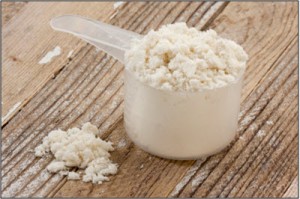Background:
In short-term studies with subjective assessment of hunger and satiety, dietary protein has been shown to be more satiating than fat or carbohydrate intake. However, not all longer-term studies showed that increased protein intake improved body weight or composition. One consideration that may play a role in the success of weight loss may be the source of the protein. In particular, supplemental whey protein may support lean body mass during weight loss.
Benefits of Whey Protein
- Whey protein has the highest biological value of any protein.
- Whey protein is a rich source of branched chain amino acids (BCAAs) that are metabolized directly into muscle tissue and are the first ones used during periods of exercise.
- Whey protein is an excellent source of the essential amino acid, leucine. Research has shown that individuals who exercise benefit from diets high in leucine and have more lean muscle tissue and less body fat compared to individuals whose diet contains lower levels of leucine. Whey protein isolate has approximately 50% more leucine than soy protein isolate.
- Whey protein is a soluble, easy to digest protein and is efficiently absorbed into the body.
- Whey protein contains bioactive components that help stimulate the release of two appetite-suppressing hormones: cholecystokinin (CCK) and glucagon-like peptide-1 (GLP-1).
New Data:
In a study involving 90 overweight and obese subjects randomly assigned to 1 of 3 treatments for a period of 23 weeks: 1) whey protein (56 g/day); 2) soy protein (56 g/day); 3) an equal amount of carbohydrate. Results showed supplementation with whey protein was found to be associated with reductions in body weight (-1.8 kg), fat mass (-2.3 kg), waist circumference, and fasting ghrelin levels. No such changes were found in the soy protein or carbohydrate groups. The authors state, “Through yet-unknown mechanisms, different sources of dietary protein may differentially facilitate weight loss and affect body composition.”
Reference:
Baer DJ, Stote KS, et al. Whey protein but not soy protein supplementation alters body weight and composition in free-living overweight and obese adults. J Nutr, 2011; 141(8): 1489-94.



